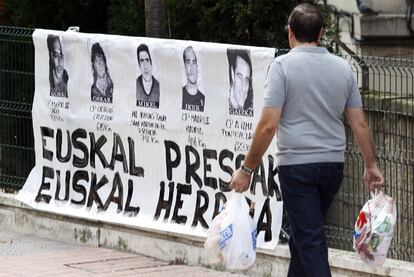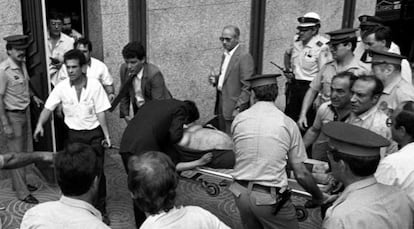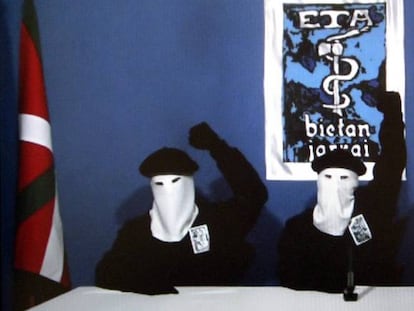ETA prisoner: ‘I would like to offer my condolences to the families of the three people I killed’
More than 40 inmates from the Basque terrorist group have asked in writing for forgiveness from their victims’ families in 2020 compared to 30 last year and eight in 2018


Last July, a member of the now-disbanded Basque terrorist group ETA, Mikel Azurmendi, alias Hankas, sent a long handwritten letter to the director of the Valencia Penitentiary Center complaining that, after 22 years behind bars, he was still in primer grado, or Grade 1, the strictest category in the three-level prison system, preventing him from accessing any prison benefits.
Azurmendi was sentenced to 418 years for a number of crimes including the 1998 murder of Alberto Jiménez Becerril, a Popular Party (PP) councilor of Seville City Hall, and his wife. In his letter, Azurmendi argued that he had long since rejected violence: “I do recognize the harm I have done,” he wrote.
On November 11, the Spanish Interior Ministry announced that he and his partner, Maite Pedrosa, another former member of ETA, would be transferred to a prison near the Basque Country, in Zuera, Zaragoza. The decision triggered a political storm as it came after the Basque nationalist party Bildu agreed to support the central government’s budget plans.
If they told me that my meeting with him could allow him to shorten his sentence by one minute, I would have said no, out of respect for the rest of the victimsRoberto Manrique, victim of ETA attack in 1987
Azurmendi is one of 42 ETA prisoners who have asked for forgiveness by letter so far this year, according to data on the war against terror accessed by EL PAÍS. The figure is higher than last year, when there were about 30, and far higher than in 2018, the year in which the Basque terrorist group announced its complete dissolution; at that time, there were just eight.
There are currently 197 ETA members being held in Spanish prisons. “The leap has been both quantitative and qualitative,” says a police spokesman, with regard to the content of the letters. “Shortly after the dissolution of ETA, the texts were all similar and followed the guidelines of the EPPK [Basque acronym for the ETA prisoners’ collective] to show no regret or tell on others. Now, some also express repentance.”
In one letter, an ETA member wrote: “I would like to convey my condolences to the families of the three people [I killed], and ask their forgiveness.”
The EPPK guidelines were set in January 2018, when the organization announced the “total willingness” of ETA prisoners to acknowledge the pain caused by their actions in exchange for improved prison conditions. In April of that year, ETA issued a statement in which it also admitted the harm it had caused as a preliminary step before its formal dissolution just weeks later. Some prisoners had already shifted in that direction, such as Jagoba Codó who was granted conditional release by Spain’s High Court, the Audiencia Nacional, last August. In a written statement he penned in 2017, Codó expressed a generic rejection of violence: “Nobody is removed from the pain, neither the one who suffered it nor the one who caused it, and I am paying for it criminally,” he wrote.

Other inmates followed in Codó’s footsteps with missives that also had “very standardized” content, according to police sources. In one, the prisoner used impersonal language to explain that he now wanted to use “political channels for political ends” and recognized “the damage caused during the decades-long existence of the organization to which I belonged.”
Basque government sources following the evolution of ETA prisoners stress that impersonal letters like these, which keep to a format prepared by defense lawyers, continue to account for the majority. In their opinion, the purpose of these letters is to try to facilitate the transfer to a prison near Basque Country and receive better prison conditions. EL PAÍS has tried to contact several ETA lawyers, but they have declined to talk, as has Etxerat, the association of prisoners’ relatives that is closely aligned with the EPPK.
However, several prisoners have sent letters in recent months in which they have even mentioned the people they killed. “I recognize the harm caused to the victims as a result of my armed activity in that organization, especially the three victims [the name and surname of each], as well as their loved ones and the people who were injured,” states one letter from an ETA prisoner, who remains anonymous to avoid reprisals. The missive adds: “In recognizing the seriousness of having taken their lives and even the impossibility of returning them, I want this acknowledgment and regret to contribute to atoning in part for the damage and suffering caused to the victims of terrorism, to all the victims.”
“It should never have happened”
Another ETA member wrote last year: “In its day, ETA as well as the collective of prisoners, recognized the damage done. For my part, I also want to recognize the damage that the armed struggle has caused over the years, as well as committing myself to overcoming the problems of the conflict.” He went on to write: “This should not have happened and I want to express that because it’s how I feel, just as I think that a solution to end so much suffering is long overdue.” This ETA prisoner ended by acknowledging that the pain and damage done “has no solution,” and by expressing his “respect for the dead, the injured and the other victims.”
A Basque government spokesman considers these kinds of written statements a step in the right direction while pointing out that there are still only very few examples – not even a dozen. This he blames on the Basque radical left – known as the abertzale – which, in his opinion, does not allow the ETA prisoners to go further and really condemn what the terrorist violence amounted to.
Meanwhile, the Association for the Victims of Terrorism (AVT) is more skeptical, calling the actual existence of the letters into question. Carmen Ladrón de Guevara, a lawyer for the association, criticizes the fact that the Interior Ministry uses the letters to justify transferring ETA prisoners to penitentiaries in Basque Country. “These letters have never been shown to us,” she says. “Not to us, as an association, nor to any of the victims.” As far as Ladrón de Guevara is concerned, “true repentance” does not reside in these letters but “in collaborating with the justice system, which we are not seeing.”

In contrast, Roberto Manrique, who was seriously injured in the 1987 ETA attack on a Hipercor supermarket in Barcelona that killed 21 people, believes these letters to be “positive.” In January 2011, with ETA still active, Manrique received a letter from Rafael Caride Simón, one of the ETA members who planted the car bomb in the supermarket parking lot and who, at the time of writing, was a member of the so-called “Via Nanclares” reintegration program. In it, he said: “I recognize the damage and suffering caused to people like you by the actions carried out during our militancy in ETA. I am not insensitive to the pain and suffering that they caused; hence my sincere commitment to try to help heal those wounds and to ensure that no one else suffers what you have suffered.” A year after receiving that letter, Manrique had “a restorative justice” encounter in prison with Caride Simón and came away convinced of his sincerity. “I believed he was repentant,” he says.
However, Manrique stresses that this type of gesture should not lead to prison benefits. “If they told me that my meeting with him could allow him to shorten his sentence by one minute, I would have said no, out of respect for the rest of the victims,” he says. After 19 years in Spanish prisons and another seven behind bars in France, Caride Simón was released in August 2019 after two years on conditional release. “That’s the law and we have to abide by it,” adds Manrique. “I’m convinced he was in prison as long as he had to be.”
End of ETA
English version by Heather Galloway.









































